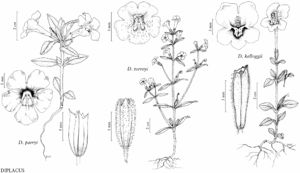Difference between revisions of "Diplacus kelloggii"
Phytoneuron 2012-39: 32. 2012.
FNA>Volume Importer |
FNA>Volume Importer |
||
| Line 15: | Line 15: | ||
|label=Endemic | |label=Endemic | ||
}} | }} | ||
| − | |basionyms={{Treatment/ID/ | + | |basionyms={{Treatment/ID/Basionym |
|name=Eunanus kelloggii | |name=Eunanus kelloggii | ||
|authority=Curran ex Greene | |authority=Curran ex Greene | ||
| + | |publication_title=Bull. Calif. Acad. Sci. | ||
| + | |publication_place=1: 100. 1885 | ||
}} | }} | ||
|synonyms={{Treatment/ID/Synonym | |synonyms={{Treatment/ID/Synonym | ||
| Line 61: | Line 63: | ||
|publication year=2012 | |publication year=2012 | ||
|special status=Selected by author to be illustrated;Endemic | |special status=Selected by author to be illustrated;Endemic | ||
| − | |source xml=https://jpend@bitbucket.org/aafc-mbb/fna-data-curation.git/src/ | + | |source xml=https://jpend@bitbucket.org/aafc-mbb/fna-data-curation.git/src/f6b125a955440c0872999024f038d74684f65921/coarse_grained_fna_xml/V17/V17_1394.xml |
|genus=Diplacus | |genus=Diplacus | ||
|species=Diplacus kelloggii | |species=Diplacus kelloggii | ||
Revision as of 18:28, 24 September 2019
Herbs, annual. Stems erect to ascending, 10–310(–370) mm, glandular-puberulent and/or glandular-pubescent. Leaves usually basal, sometimes basal and cauline, relatively even-sized; petiole absent, larger with petiole-like extension; blade obovate to elliptic, (4–)6–40(–52) × (2–)3–17(–26) mm, margins entire or crenate, plane, apex obtuse, surfaces often pubescent. Pedicels 2–6(–10) mm in fruit, usually twisting to invert calyx. Flowers 2 per node, or 1 or 2 per node on 1 plant, chasmogamous. Calyces distinctly asymmetrically attached to pedicel, not inflated in fruit, (7–)8–16(–17) mm, densely glandular-puberulent or glandular-pubescent, lobes subequal, apex obtuse, ribs purplish, intercostal areas whitish. Corollas: throat dark purple, golden yellow at base with reddish speckling, limb magenta to reddish purple, lateral adaxial lobes each with a dark purple basal spot, palate ridges golden yellow, tube-throat (13–)20–45(–50) mm, limb 10–18 mm diam., bilabiate, abaxial lip smaller than adaxial. Anthers (distal pair) exserted, glabrous. Styles densely glandular-puberulent distally. Stigmas exserted, lobes unequal, abaxial 4–5 times adaxial. Capsules 6–12(–13) mm, indehiscent. 2n = 18.
Phenology: Flowering Mar–Jun.
Habitat: Near water runoff areas, away from seeps or other areas with prolonged moisture.
Elevation: 50–1500 m.
Discussion
Diplacus kelloggii occurs in southwestern Oregon and broadly in northern California.
Selected References
None.
